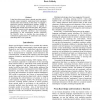Free Online Productivity Tools
i2Speak
i2Symbol
i2OCR
iTex2Img
iWeb2Print
iWeb2Shot
i2Type
iPdf2Split
iPdf2Merge
i2Bopomofo
i2Arabic
i2Style
i2Image
i2PDF
iLatex2Rtf
Sci2ools
FLAIRS
2003
2003
Using Mental Simulator for Emotional Rehabilitation of Autistic Patients
It has been discovered about a decade ago that autistic people cannot properly understand and reproduce mental states and emotions. In this study we suggest a particular emotion rehabilitation strategy, based on playing with mental simulator that is capable of modeling the mental and emotional states. We present the model of mental world, approach the formalization of emotions, describe interface and reasoning mechanism of the multiagent mental simulator NL_MAMS. Also, we discuss the case studies of substantial improvement of emotional and mental reasoning skills of two patients.
Artificial Intelligence | FLAIRS 2003 | Mental Reasoning Skills | Mental Simulator | Multiagent Mental Simulator |
| Added | 31 Oct 2010 |
| Updated | 31 Oct 2010 |
| Type | Conference |
| Year | 2003 |
| Where | FLAIRS |
| Authors | Boris Galitsky |
Comments (0)

